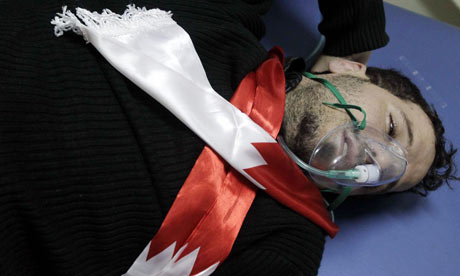Time to wrap this live blog up after 23 hours of following the tumult in the Middle Eastern and North African world.
Thanks for reading – and we have started a new live blog which you can find here, with Matthew Weaver in London.
The New York Times posts its coverage of the Pearl roundabout assault:
The square was filled with the crack of tear gas canisters and the wail of ambulances rushing people to the hospital. Teams of plainclothes police officers carrying shotguns swarmed through the area, but it was unclear if they used the weapons to subdue the crowd.
"There was a fog of war," said Mohammed Ibrahim as he took refuge in a nearby gas station. He was barefoot, had lost his wallet and had marks on his leg where he said he had been beaten. "There were children, forgive them."
At least two people were killed in the mayhem, according to witnesses at a nearby hospital and news agency reports. Many people were injured in the chaos — trampled, beaten or suffocated by the tear gas.
Emile Hokayem, Middle East analyst at the International Institute for Strategic Studies, lives near the Pearl roundabout – nicknamed Lulu by protesters – and he tweets: "I confirm 4 BDF tanks on lulu roundabout".
He also has this observation on the geopolitical implications.
There's a few complaints on blogs and Twitter about al-Jazeera's coverage of events in Bahrain. I can't speak for the Arabic channel's coverage but AJE has been excellent throughout the night.
There are many reports of the authorities preventing medical treatment for the injured from Pearl roundabout.
AP sums up the latest scenes in Bahrain's capital as the military spread out across the island:
Hours after police retook control of the plaza, the tiny island nation was in lockdown mode. Tanks and armored personnel carriers were seen in some areas — the first sign of military involvement in the crisis. Police checkpoints were set up along main roadways and armed patrols moved through neighborhoods in an apparent attempt to thwart any mass gatherings.
Barbed wire was put up around Pearl Square and a message from the Interior Ministry declared the protest camp "illegal." The air still carried the smell of tear gas more than four hours after the assault.
The leader of Bahrain's main Shia opposition group said the storming of the Pearl roundabout site where protesters had camped out overnight was "real terrorism."
"Whoever took the decision to attack the protest was aiming to kill," Abdul Jalil Khalil, a parliamentarian with the Wefaq bloc, told Reuters.
Just got off the phone with the Guardian's Martin Chulov in Manama. He followed the group of protesters intending to march back to Pearl roundabout but says they were stopped and turned back about two kilometres from the site by a mass of police firing birdshot and huge numbers of sound grenades.
With tanks also en route to the roundabout it seems the Bahraini authorities are taking no chances of allowing it to become a second Tahrir Square.
Reuters confirms the heavy military presence on the streets of Bahrain's capital, heading towards the site of the recent protests:
More than 50 armoured vehicles were seen travelling towards Pearl Square in central Manama on Thursday, shortly after Bahrain police cleared hundreds of protesters from the square in the early hours.
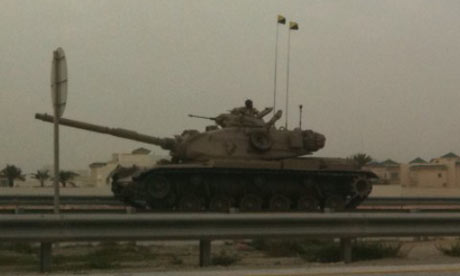 Bahrain army tanks moving through the countryside
Bahrain army tanks moving through the countryside
Tanks are seen on the streets of Bahrain. This photo shows what the photographer claimed was one of a group of 30 tanks heading to Tubli, southeast of Manama.
I've just been speaking by phone to the Guardian's Martin Chulov at the SMC Hospital, Bahrain's largest, which he says is crowded with thousands of people who have gathered there since the police assault on Pearl roundabout:

Many of them were at the Pearl roundabout when the attack began shortly after 3.15am. The attack was coordinated from every direction, and the tent city they had set up was literally cut through with knives. The lead trauma surgeon at SMC hospital was tied up and assaulted, and he's now in intensive care at the hospital.
There was no official word on deaths or injuries so far, but hospitals in Bahrain have reported hundreds of people with serious gaping wounds, broken bones and breathing difficulties caused by heavy doses of tear gas.
Martin says there were remarkable scenes of angry protesters surrounding the hospital's fleet of ambulances, demanding that they to return to Pearl roundabout to help the injured:
There are at least 20 ambulances that were prevented from returning to the square by the security forces. They have just been forced to leave by the thousands here who have become angry at their refusal, especially a group of 300 to 400 nearly hysterical women pleading with them to return.
Now the ambulances have left many of the protesters have now set off on foot to also return to the Pearl roundabout – setting up a likely confrontation with the heavy police presence who have ringed the roundabout with vans.
I've just been speaking to Neil, a British research student in Islamic politics visiting Bahrain, who saw the prelude and aftermath of the police raid on the Pearl roundabout:
My hotel is about a three or four minute walk from the roundabout where the protesters where. I was on a flyover overlooking it with a Bahraini friend, about an hour before the police moved in. It was totally peacful, there were lots of families, lots of kids, people talking, a speaker saying how the protests weren't about Sunnis or Shias.
Neil said the atmosphere in the camp was very friendly as he chatted to protesters in Arabic: "As protests went it was incredibly fluffy."
Neil returned to his hotel and got a phone call afterwards from a friend at scene, saying that the police had arrived in force, with clouds of tear gas in the air. By the time he got hurried back to the Pearl roundabout the site had been emptied of protesters:
Now there was nothing there, the police had completely cleared the square. The riot police were dismantling all the infrastructure that the protesters had built up over the last few days, all the sound systems and ripping the pegs out of the big Bedouin tents, they were taking it all down. It happened very quickly and suddenly everyone was gone.
While he observing he caught the attention of the police:
While I was watching a couple of young cops, one of them with a tear gas gun, started hissing at me, to get my attention. I said to them that I was a foreigner, that'd I'd just come to watch, and that it was probably safer if I left.
In the carpark area behind his hotel Neil saw some of the protesters moving away from the area. "I saw guys quite dazed, stumbling around looking shocked. I spoke to one young guy who said the police had pushed them all out and he didn't know what to do, he was looking quite bedraggled."
Bahrain's ministry of the interior announces on Twitter the "evacuation" of Pearl roundabout. Another ground-breaking use of social media.
The Associated Press's Hadeel al-Shalchi has talked to protesters at the roundabout when the police assault began:
After the crackdown early Thursday, protesters who were camped in the square described police swarming in through a cloud of eye-stinging tear gas.
"They attacked our tents, beating us with batons," said Jafar Jafar, 17. "The police were lined up at the bridge overhead. They were shooting tear gas from the bridge."
Hussein Abbas, 22, was woken by a missed call from his wife, presumably trying to warn him about reports that police were preparing to move in.
"Then all of a sudden the square was filled with tear gas clouds. Our women were screaming ... What kind of ruler does this to his people? There were women and children with us!"
ABC News journalist Miguel Marquez was beaten by Bahraini security forces near Pearl Square – while doing a report with his colleagues in New York by phone.
In audio recordings posted on ABC News's website you can hear Marquez being attacked while trying to talk to his assailants:
Marquez said he was not badly injured, but he was hit with billy clubs and his camera was pulled from his hands while he yelled, "Journalist, journalist!" – trying to show he was not a protester.
"There was a canister that looked like – No! No! No! Hey! I'm a journalist here!" he yelled.
"I'm going! I'm going! I'm going! I'm going!" he said. "I'm hit. I just got beat rather badly by a gang of thugs," Marquez said. "I'm now in a marketplace near our hotel where people are cowering in buildings."
He paused.
"I mean, these people are not screwing around," he added. "They're going to clear that square, tonight, ahead of any protest, on Friday. The government clearly does not want this to get any bigger."
An official response comes from the Bahraini government, with a statement by the ministry of the interior. It confirms that police have cleared Pearl Square "after trying full opportunities for dialogue":
Ministry of Interior spokesperson Brigadier Tariq Hassan Al Hassan has announced that security forces have cleared protesters from the area of Pearl Roundabout after trying all opportunities for a dialogue with them, to which some responded positively and left quietly. Others refused to obey the law which led to interference to make them leave, he said.
He said that security forces had been keen on exercising self-control and on communicating with the protesters through public figures to end the sit-in peacefully, in order to ensure that law was followed within the institutions of state. But some protesters exploited the situation by introducing illegal practices and disturbing citizens and residents by erecting checkpoints in the area surrounding the roundabout and stopping vehicles and passersby. This was considered a major illegal practice which spread fear among the public and adversely affected commercial and economic activity.
The spokesperson said the Ministry of Interior had received numerous complaints from the public regarding the massive personal inconvenience and economic losses they had been suffering. He said the protest in such an important area greatly affected national economy, trade, tourism and public interests and also caused traffic jams.
Reuters's Frederik Richter has some gripping detail on the assaults in Manama, which has now been cleared of protesters:
Bahraini police broke up a protest camp in a central Manama square on Thursday, killing at least two people, as they tried to end three days of demonstrations inspired by uprisings in Egypt and Tunisia, witnesses and the opposition said.
"Police are coming, they are shooting teargas at us," one demonstrator told Reuters by telephone. Another said: "I am wounded, I am bleeding. They are killing us."
One protester said he had driven away two people who had been wounded by rubber bullets.
There are reports of a third death. An eyewitness tells al-Jazeera that he saw one dead body in a hospital in Manama riddled with what sounds like birdshot or buckshot.
All the protesters interviewed insist that the police gave no warning of the assault on the square, and that many of the protesters were asleep, with the crowd including women and children.
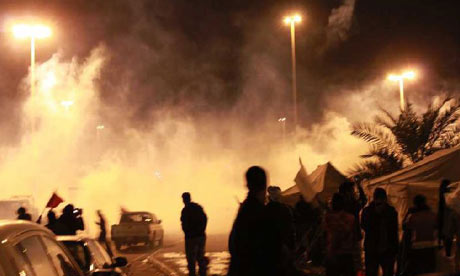 Clouds of tear gas hang in the air around Pearl Square in Manama. Photograph: Bahrain Centre for Human Rights
Clouds of tear gas hang in the air around Pearl Square in Manama. Photograph: Bahrain Centre for Human Rights
The Bahrain Centre for Human Rights has posted the above photograph of the assault by police and security forces on Pearl Square in the early hours of the morning – note the heavy clouds of tear gas.
Here is some unconfirmed YouTube footage said to be taken during the assault.
The two people said to have died at Pearl square in Manama were a 23 year-old man and a 55 year-old man, according to al-Jazeera.
The opposition group Al Wefaq says the two men were killed when riot police used tear gas and rubber bullets to drive out protesters from the roundabout.
The FT's Robin Wigglesworth and Simeon Kerr report from Manama on the morning raid on the protest camp at Pearl roundabout:
At least two protesters were killed as Bahrain police forcefully broke up an encampment of thousands of demonstrators demanding greater political freedom in the strategically important Gulf state.
Police early on Thursday morning dispersed the largely Shia demonstrators who had since Tuesday sought to turn the Lulu roundabout in central Manama into the country's equivalent of Cairo's Tahrir Square and dubbed it 'Martyr's Square'.
Witnesses said police beat the protesters who had built makeshift camps on the roundabout. An aerial view of the roundabout suggested police had retaken complete control of the area by 4am local time, with demonstrators dispersing throughout the capital.
Al-Jazeera is speaking to protesters at a hospital in Manama, with talk of two confirmed dead and many more injured following the police assault in the morning.
AP's Hadeel al-Shalchi has more details:
Riot police firing tear gas and rubber bullets stormed a landmark square occupied by anti-government protesters Thursday, driving out demonstrators and destroying a makeshift encampment that had become the hub for demands for sweeping political changes in the kingdom.
There was no immediate word on casualties or arrests during the pre-dawn assault on Pearl Square, which was filled with flattened tents and trampled banners. After police regained control of the square, they continued to chase protesters through sidestreets.
The blow by authorities marked a dramatic shift in the protests. It appeared Bahrain's leaders sought to contain security forces after clashes Monday that left at least two people dead and brought sharp criticism from Western allies, including the US.
The Financial Times's Robin Wigglesworth is in a hotel overlooking Pearl square and is tweeting:

The air is heavy with teargas. A lot of it. People seem to have left Lulu totally now, but wonder what tomorrow will bring.
Went down to #Lulu, place is cleared by police. When people regrouped and tried to return they were forced back by teargas and rubber shots
Tariq al-Olaimy tweets on his narrow escape from Pearl square – nicknamed Lulu by the protesters – as the police were moving in on the protesters camped there.
CNN's Nic Robertson appears to have been near the Pearl roundabout when the police made their move in a pre-dawn raid on the protesters.
The Associated Press is now reporting about the violent crackdown taking place in Manama:
Riot police are using tear and clubs to try to regain control of a main square in Bahrain's capital occupied by anti-government protesters.
Hundreds of security forces carrying truncheons and firing rubber bullets moved into Pearl Square before dawn on Thursday. There was no immediate word on casualties.
More reports are coming in of the attacks by Bahrain security forces on protesters in Pearl Square on Manama.
Police appear to have started by firing rubber bullets and tear gas into the square at sometime around 3am, and then moved in towards the crowd.
There are numerous messages on Twitter and other social media of a large squad of police and security forces in the area. Earlier in the evening there were estimates of thousands of protesters camped on the roundabout, but numbers dwindled later in the night.
There are reports that riot police in Manama are massing trying to oust protesters from Pearl Square and regain control of the base being used by the demonstrators.
The New York Times's Nicholas Kristof interviews protesters in Bahrain.
It seems the "Arab spring" has even reached Iraq, where protesters against the government fought with police in the city of Kut, leading to three people being killed and dozens injured. Protesters chanted their displeasure at Iraqi prime minister Nuri al-Maliki and his government, while making demands for improved services
Ehsan Al-Kooheji – who has been tweeting as @ehsankooheji – is worried about the effects of the protests, despite the protesters gaining a podium "for the first time in history":
I am disappointed by the international reaction which is trying to understand Bahrain relative to Egypt or Tunisia, or focuses only on Government opposition movements ignoring the above-mentioned intricacies. Bahrain is unique in its situation in the region, and has complex dynamics and demographics which are so difficult to understand that they are not even fully appreciated by some citizens of the country who have been here their whole lives.
Yet I am more disappointed by my fellow citizens here who are polarized and unwilling to accept any opinion other than their own.
On the subject of regime change in the Middle East, former US secretary of state Colin Powell wants questions answered about of the CIA's use of discredited intelligence from its agent "Curveball" regarding Iraq's supposed weapons of mass destruction:
"It has been known for several years that the source called Curveball was totally unreliable," he said to the Guardian. "The question should be put to the CIA and the DIA as to why this wasn't known before the false information was put into the NIE sent to Congress, the president's state of the union address and my 5 February presentation to the UN."
You can follow the Guardian's excellent Curveball coverage here.
A Guardian reader in Bahrain emails after spending a few hours at the Pearl roundabout, the centre of protest in the small island state.
He reports that the square was packed with thousands of people, with deafening chanting and – in an unusual touch – singing of the Egyptian national anthem.
As in Egypt, it appears that Bahrain's protesters are planning a major demonstration is planned for after prayers on Friday.
Reuters's bureau in Tripoli has some news from Benghazi, where hundreds of protesters clashed with police and pro-government supporters:
Quryna newspaper, which is based in Benghazi, reported 38 people were hurt in the clashes, most of them members of the security forces. It said they had all been discharged.
"Last night was a bad night," a Benghazi resident, who did not want to be identified, told Reuters by telephone.
"There were about 500 or 600 people involved. They went to the revolutionary committee (local government headquarters) in Sabri district, and they tried to go to the central revolutionary committee ... They threw stones," he said.
"Now Benghazi is quiet. The banks are open and the students are going to school," the same witness said later. He said there were no reports of anyone killed in the clashes.
The Guardian's Jack Shenker gets Egyptian reaction to the news of the brutal assault on CBS correspondent Lara Logan in Tahrir Square:
"It's incredibly sad that this has happened, and it's something that the spirit of Tahrir and the spirit of revolution was resolutely against," Ahdaf Soueif, an author who spent a great deal of time in Tahrir Square, told the Guardian. "Women in the square were rejoicing that they felt freedom on the streets of Cairo for the first time, and [this is] definitely something that we want to stamp out alongside corruption and all the other social ills that have befallen Egypt during Mubarak's regime."
A video of protests in Sanaa, although it may have been filmed yesterday, showing the Yemeni security forces appearing relatively restrained while dogged by chanting protesters.
The Guardian's Giles Tremlett passes on this excellent video from Morocco, with English subtitles added by @mariammaslouhi. "It explains why some protesters, young and not so young, will be out in cities across the country on Sunday," says Giles, referring to the 20 February protests planned for the kingdom.
One place you won't hear about the protests in Libya is on Libyan state media, since the country's official news agency has not reported on any of them, other than to mention that supporters of Gaddafi demonstrated in Tripoli, Benghazi and elsewhere.
Libyan state television has shown footage of rallies by government employees and students, including a large crowd in Tripoli chanting: "Muammar is our leader. We don't want anyone but him."
Here's a round up of the protests and reaction being reported in cities across Libya. Because of reporting restrictions imposed by the Libyan government reliable eyewitness reports are hard to come by so this is an amalgam of social media and opposition reports via third parties in other Arab states, including Tunisia:
• The city of Beyida has seen some of the heaviest clashes between protesters and security forces, with police stations set on fire. Police responded by rounding up activists. Lately there have been repeated claims of the use of live fire by security forces, with some witnesses seeing snipers in the security headquarters wounding several people.
• Benghazi: Protests continued into a second day in the countries second largest city, with police using rubber bullets and water cannon on protesters following by the arrest of a human rights activist there, although the numbers involved are said to be small. Witnesses said the protests were peaceful but were attacked by Gaddafi loyalists.
Reuters quotes a "Libyan security official" saying that 14 people, including 10 policemen, were injured. The official also accused protesters of being armed with knives and stones.
• In Zentan, south of Tripoli, hundreds of protesters marched through the streets and set fire to a police station and government offices, before establishing a camp in the centre of the city modeled on Egypt's Tahrir Square.
There is a collection of recent videos from the protests in Libya here.
Bahraini blogger Ali Ashtizadeh sends this tweet, part of an effort by many in the opposition to confirm that their demands do not include attacking the al-Khalifa ruling family.
Abdelhamid Mehri, one of the last surviving leaders of Algeria's war of independence against France, has written a letter to the country's president calling for radical constitutional reform.
In the letter, obtained by Reuters, Mehri said that Algeria's form of government is "no longer capable of addressing the big challenges facing the nation," and comparing it to the governments of Tunisia and Egypt in having "a democratic facade but exclude, through different means, a large part of the citizens from participating in public life".
Reuters's Lamine Chikhi reports from Algiers:
Mehri's words carry weight because he was a leading figure in Algeria's struggle against French colonial rule and helped forge the country's identity after independence.
Mehri, who is 84, is one of only two Algerians still alive who negotiated the Evian Treaty, which ended France's 130-year colonial rule after a war of independence that killed hundreds of thousands of people.
Bloomberg Television has an interview with Wael Ghonim, in which he's asked about the problems facing Egypt:
There are two problems. The wages – some people are being paid at $50, $60 a month. They're not able to live with that. They have to work two or three jobs, have to borrow money. That's a huge problem and there is no solution for it at the moment. The second problem is unemployment. There are one million newborn kids in Egypt every 10 months. They need jobs and education. Basically, these are the real challenges I see, and this is where, as a young movement now, we realize that we have completely shifted now our attention. There's a group working on democracy and enforcing it, which is something I'm very optimistic about.
But he doesn't sound enthusiastic about a continued role for himself:
This is one thing I am thinking a lot about – my role. I don't have political interests, I don't want to be involved in any government. I did this for the people, I did not have any personal interests. I do not want to be misunderstood that he did all this because he was looking for – I think I'm 90% done with my job. The rest of the 10%, the question is how many days it will take to finish that, which is something I'm thinking about right now.
White House spokesman Jay Carney – in his first day in the job, replacing Robert Gibbs – was asked about the protests in Bahrain during the daily briefing.
Carney said Bahrain's government should respect the rights of its citizens to protest and urged all sides to refrain from violence, adding: "We are watching the developments in Bahrain and across the region very closely."
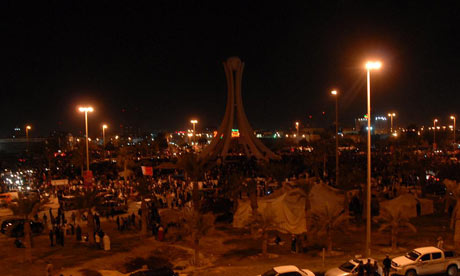 Protesters remaining overnight in Pearl Square roundabout in Manama, Bahrain
Protesters remaining overnight in Pearl Square roundabout in Manama, Bahrain
Above is a photo of Bahrain's Pearl Square in Manama, showing the groups of protesters milling around the tent camp that has sprung up. The Associated Press's Hadeel al-Shalchi visits Pearl Square and reports:
As night fell on Wednesday, the mood suggested protesters were settling in for the long haul. People sipped tea, ate donated food and smoked apple- and grape-flavored tobacco from water pipes. The men and women mainly sat separately – the women a sea of black in their traditional dress.
The leadership of the protesters is still unclear and disorganized. A few scuffles have broken out between some of the people in the main area near the speakers' platform.
Among the most commonly stated demands were the creation of a constitutional monarchy, fair elections, release of political prisoners, and the resignation of the prime minister and the entire parliament.
"I am not a political man. I am a musician, but I know I want a chance to pick my own prime minister," said Jassem Jawad, 23. "How is it fair for a prime minister to hold power for 39 years? It's ridiculous. We want a real democratic system."
Mir Hussein Moussavi's Facebook page has chilling news of an attack on the home of Hossein Karroubi, the son of opposition political candidate Mehdi Karroubi:
In an interview with Saham News that took place minutes ago, Hossein Karroubi stated: "Approximately 20 security officers arrived at my residence, broke down the door to the main entrance and entered the building, despite the fact that no one was home. Sadly these individuals proceeded with the destruction of property, disturbing the peace and creating fear and discomfort amongst the neighbors and residents of the building.
Hossein Karroubi added: "This type of behavior is neither Islamic, Iranian nor human, but rather similar to the behavior of fascist governments in dealing with their opponents. At this moment the security forces remain at my house going through my personal property and that of my family. As a result of their behavior, my youngest child no longer feels safe at home. We no longer even have access to their school books and personal belongings."
It is worth mentioning that Hossein Karroubi was arrested three weeks ago and was interrogated for several hours. These incidents are designed to increase pressure on Mehdi Karroubi's family who have experienced this type of behavior on numerous occasions over the past 20 months [since the 2009 presidential elections in which Mehdi Karroubi was a candidate].
Hosni Mubarak "has given up and wants to die" according to an unnamed Saudi official quoted by Reuters and posted by Ahram Online:
An official in Saudi Arabia said the kingdom had offered to host Mubarak but he was determined to see out his days in Egypt. Official confirmation could not immediately be obtained from the Saudi government.
"He is not dead but is not doing well at all and refuses to leave. Basically, he has given up and wants to die in Sharm," said the Saudi official, who asked not to be named.
Hillary Clinton calls the swelling outbreak of protests as an "historic moment" in a speech today in Washington DC:
Across the Middle East today we see people calling on governments to be more open, more accountable, more responsive. People want a stronger voice in their own affairs.
It is in the interests of governments to answer these demands, to reflect the will of their own people.
The Washington Post's Janine Zacharia reports from Manama on how the Saudi regime may be already sending help to its beleaguered al-Khalifa neighbours:
Although Iran has historic connections to Bahrain and wields influence with Bahrain's Shiite masses, Saudi Arabia props up the ruling Sunni al-Khalifa royal family with cash. With dwindling oil resources, Bahrain relies on Saudi Arabia – which is connected to Bahrain by a lengthy causeway – for money and a security blanket.
Regional experts predicted that if demonstrations spin out of control, Saudi Arabia could intervene to ensure the al-Khalifa family remains in power. Already on Wednesday there were unconfirmed reports that Saudi police had come across the causeway to combat protests.
The power of Twitter in another form: Nir Rosen, a fellow at New York University's Centre on Law and Security, has resigned after posting a series of offensive tweets after news broke of the brutal attacks on journalist Lara Logan.
NYU accepted his resignation but the director of the Centre on Law and Security commented:
However, this in no way compensates for the harm his comments have inflicted. We are all horrified by what happened to Ms Logan, and our thoughts are with her during this difficult time.
Writing in the Washington Post, Condoleezza Rice writes on the future of a democratic Egypt – and offers more support to the outcome than many Republicans on the party's foreign policy wing.
Here she attempts to persuade the Republican hawks:
For all his failings, Mubarak maintained a cold peace with Israel, which became a pillar of Egyptian foreign policy. He supported moderate Palestinian leadership and helped keep Hamas at bay. But he could never do so fully because he was afraid of "the street." Authoritarians don't know or respect their people, and they fear them. The United States has taken a good deal of public blame from friends who secretly supported our policies - fueling hatred against us while shielding themselves.
The BBC has a very handy guide to the countries in the Middle East and North Africa facing unrest, complete with the Economist Intelligence Unit's "shoe thrower's index" ranking and other data.
The STI (as we can call it) has Yemen top with 86%, and Libya second at 71% – suggesting both those countries are the likeliest sites of further protests and tension.

My colleague Richard Adams is taking over the live blogging reins now.
Egypt's health ministry says 365 people have been killed since the anti-government protests began.
Minister Ahmed Sameh Farid said it was only a preliminary count of civilians killed and did not include police or prisoners.
A previous estimate by the United Nations put the total at around 300.
This video on Facebook is purportedly protests in Banghazi, Libya. Apparently they are saying: "Gaddafi, we don't want your flats, we want the truth."
The Yemeni president, Ali Abdullah Saleh, has been on the phone to Bahrain's king to express support for the king, as both countries face protests. Saleh blamed people with "foreign agendas" for trying to spread chaos across the region, Reuters reports, citing Yemen's state news agency. Saleh reportedly said to King Hamad:
There are plans to try and sink the region into a fervour of chaos and violence, and they have targeted the security of the region and stability of our countries. The people creating these works of chaos and sabotage are only implementing suspicious foreign agendas.
My colleague Saeed Kamali Dehghan has written a story about the death of Saane Zhaleh (see 3.34pm), whose family says is being is being falsely described as a pro-government militia member.

A family member of Saane Zhaleh, a 26-year-old theatre student at Tehran University of Arts, told the Guardian that the Iranian authorities had launched a campaign to depict the pro-opposition protester as a member of the government-sponsored basiji militia who had been killed by what they described as terrorists.
"They [security forces] have killed him and now they want to hijack his dead body and exploit his funeral for their own purposes. His family is totally devastated and inundated in sorrow," said the family member, who asked not to be identified.
The BBC World Service is reporting two dead in Aden, Yemen.
Here is an evening summary:
• Bahrain: Thousands of protesters have continued to demonstrate at Pearl roundabout in the capital Manama. Our reporter there says there are signs of growing anger at King Hadad, who is seen as responsible for propping up the Sunni-based establishment. Thousands of people took part in a funeral for Fadhel Al-Matrook, a protester shot dead at funeral of another protester yesterday. The US, Britain and the UN have expressed concern about the violence. A government minister reportedly acknowledged that the two killings were "catastrophic" (see 3.11pm).
• Yemen: A sixth day of protests against Ali Abdullah Saleh, the president, was broken up by pro-government supporters bussed in to the capital Sana'a. Up to four protesters were injured, and 2,000 police deployed to break up the clashes. There have also been protests in other cities such as Aden and Taiz (see 3.01pm). Saleh responded by saying "chaos, wrong mobilisation and irresponsible utterance via media" was not the way to "reach the power" (see 3.38pm).
• Iran: Students and academics have been arrested in a raid at a university in Tehran. A state news agency reported clashes between government supporters and protesters after the funeral of Saane (or Sanee) Zhaleh, who was killed in protests on Monday (see 3.34pm). Mahmoud Ahmadinejad, the president, said the protests were doomed to fail.
• Egypt: Protesters are planning to gather in Tahrir Square on Friday to mark a week since Hosni Mubarak, the president, stood down (see 3.03pm). A coalition of activists have released a list of candidates they would like to see in the transitional government (see 3.14pm). Both moves are intended to put pressure on the army, which took control after Mubarak's fall.
• Libya: Up to 38 people have been injured in the city of Benghazi after protests about the arrest of a civil rights campaigner and critic of Muammar Gaddafi. There are reports that critics of Gaddafi have been arrested.
• Morocco: Protests are planned for Sunday (see 3.23pm).
France will not allow in Tunisian immigrants without a valid visa, the government has said, according to Reuters, days after thousands of illegal migrants from the country began arriving in Italy.
"Visa rules will apply to Tunisia, all visa rules and nothing but visa rules," government spokesman Francois Baroin told reporters following a cabinet meeting. "There is no question of welcoming other immigrants who do not respect the rules on visas."
Commenter Numa, who has been posting several updates reportedly from within Bahrain, posts this report about the internet in Bahrain, which we can't confirm:

Internet extremely slow in Bahrain. When I called to my provider to complain I was told it was a "global problem" all over the island with every service provider. I asked if it had to do with the demonstrations. I was told it had. I asked further. Is the govt controlling the internet access – "Yes sir, sorry sir."
Nabeel Rajab from the Bahrain Centre for Human Rights, has uploaded disturbing footage of a protester badly injured on Monday. He said the man was victim of the police. Warning: graphic content.
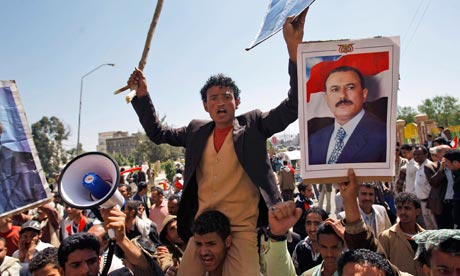 Supporters of the Yemeni government shout slogans as they try to enter Sana'a University, where anti-government protesters gather in Yemen. Photograph: Hani Mohammed/AP
Supporters of the Yemeni government shout slogans as they try to enter Sana'a University, where anti-government protesters gather in Yemen. Photograph: Hani Mohammed/AP
In a barely veiled threat to protesters in Yemen, Ali Abdullah Saleh, the country's president, has said that the time of coups, chaos and creative anarchy has gone, according to the Yemeni state news agency Saba news. Saleh was quoted as saying:
Anybody wants to reach the power, he should pass through the ballot boxes, which are the only way, but not chaos, wrong mobilisation and irresponsible utterance via media.
This (below) is a death announcement for Saane (or Sanee) Zhaleh, a student who was shot dead during an opposition rally on 14 February, created by his classmates at Tehran University of Arts. The announcement has been circulated among Iran's blogging community and social networking websites.
It reads:
From the students of Tehran University of Arts. With sorrow and regret we announce the martyrdom of our courageous, passionate friend Saane Zhaleh and we express our condolences on his death. Peace be upon his soul / and we will remember him.
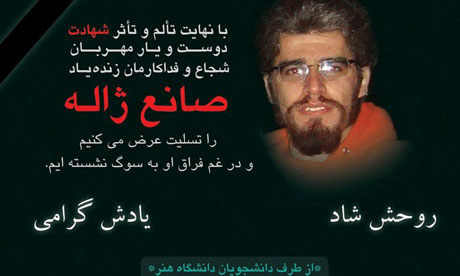
_
My colleague Mark Tran writes about a fact sheet the US embassy in London has just sent out "to show it's on the side of the angels", giving a breakdown of US funding to promote "a vibrant civil society in Egypt" and in the Middle East.
The US says since 2006, it has provided approximately $210m (£131m) to support democracy activities in Egypt:
"In FY [financial year] 2010, we more than doubled our support to civil society activities (from $9.5m to $25m). Our FY 2011 request maintains this strong support ($21m). We also significantly increased support for the Middle East Partnership Initiative (MEPI) in FY 2011 to support civil society and democratic reform across the Middle East. The US government has increased its direct support for indigenous Egyptian organisations. In FY 2010, Egyptian NGOs received $14m in US assistance, significantly above the $9m provided in FY 2009 and $8.5m in FY 2008. These funds went to support core civil society activities such as rights education, as well as democracy and building civil society capacity to expand the impact of Egypt's active citizens' groups."
To put this into context, however, US military aid for Egypt runs at $1.3bn a year. On the subject of US aid to Egypt, here is an article from the Carnegie of Endowment in Washington arguing why Egyptians are unlikely to appreciate US economic aid.
It says: "The current focus on helping businessmen, particularly powerful ones, and on US-chosen infrastructure projects that create few permanent job opportunities will keep USAID unpopular in Egypt, especially in light of the aid's small size."
Social networking sites and al-Jazeera are now reportedly back online again in Libya (see 2.51pm).
Pro-government Twitter users in Bahrain are posting updates/propaganda under using the term #silentmajority, Global Voices has spotted.
It picks out a selection of updates from Hussakhalid, described as "a tech-savvy MBA graduate who knows a thing or two (maybe three)".

Do you know that Bahrain provides free K-12 Education for all citizens? #Bahrain #silentmajority
Do you know that there are no income taxes in Bahrain? #Bahrain #silentmajority
Do you know that #Bahrain provides free healthcare for all citizens? #Feb14 #silentmajority
There is a lot of discussion in the comments of this YouTube video about protests planned for Morocco on Sunday, my colleague Giles Tremlett notes. #Feb20 and #20Fev are the hashtags being used on Twitter, and this is a popular Facebook protest site.
Jack Shenker sends some more from Cairo. A coalition of independent activists, bloggers and professional groups have released a shortlist of candidates that they would like to see make up a new transitional government in Egypt.

There's a lot of anger that despite the supreme military council's takeover, most of Mubarak's old cabinet (which had only been in place for a few weeks before he was forced out) remain in place. The army says this is essential to ensure that the country can function normally until fresh elections are called (likely to be in about six months time).
But many of those who participated in the revolution feel differently; hence they've drawn up a list of acceptable caretaker ministers for each government department and are demanding that the military take notice.
The list is currently only in Arabic, but it lays down in some detail the criteria by which each nominee has been selected: there are no members of Mubarak's NDP party, no leaders of other political parties, and nobody tainted by corruption scandals. None of those appointed should be allowed to run for office in future elections, claim the organisers of the list – thus ensuring that they act only in the interest of Egypt throughout the transitional period, instead of seeking to maximise their own position.
A government minister in Bahrain has admitted that killing two protesters was "catastrophic", according to New York Times columnist Nick Kristof.

Just interviewed the foreign minister here in #Bahrain. He acknowledges that killing protesters was catastrophic.
The UN has expressed alarm at the killing of protesters in Bahrain.
Navi Pillay, the high commissioner for human rights, said:
Too many peaceful protesters have recently been killed across the Middle East and North Africa. Authorities everywhere must scrupulously avoid excessive use of force, which is strictly forbidden in international law. They must conduct prompt, impartial and transparent investigations where there have been breaches of this obligation.
I have been urging the authorities to curb the excesses of the security apparatus and to undertake serious investigations into allegations of torture and abuse of detention rights of hundreds of political and human rights activists. These activists, including numerous children as young as 10, were reportedly arrested and detained without meaningful access to lawyers and their families, and subjected to ill-treatment in detention.
I urge the authorities to immediately cease the use of disproportionate force against peaceful protesters and to release all peaceful demonstrators who have been arrested.
Jack Shenker reports from Cairo on calls for a mass rally on Friday, the one-week anniversary of Hosni Mubarak's departure.

Some claim it will be a festival of celebration over the dictator's fall, while others are planning a more sombre event to honour the memory of those who lost their lives in the recent struggles (that number currently stands at approximately 300, though many others remain missing).
But whatever form Friday's demonstration takes, the sight of Tahrir Square – the iconic heart of Egypt's revolution – once again being transformed from a traffic-choked interchange into a sea of people, drums and flags is likely to send a strong message to the military council currently overseeing Egypt's "transition" to democracy.
Opinions are split on the genuine intentions of the army, and many will be keen to take this opportunity to remind officers that they have been mandated by the people to help establish a sustainable civilian government, not to hang on to the reins of power themselves. After issuing a series of recent communiques calling for all protests and strikes to end, it will be interesting to see how the military – who still have forces stationed in and around the square – respond to Friday's gathering.
The Associated Press has filed some more on the conflict between police and protesters in Yemen today. The news agency says Facebook and Twitter spread the word that Yemenis should join a series of "one million people" rallies on a so-called "Friday of rage" in all Yemeni cities.
A statement posted on Facebook said: "We will remain in the streets until the regime departure." The news agency reported: "Copies signed by a group named the February 24 Movement were distributed among youth via e-mail. The group is taking that name because organisers hope to have their biggest protest on that day next week." AP had this to say about Ali Abdullah Saleh, the president against whom the protesters are demonstrating:
Saleh has tried to defuse protesters' anger amid the unprecedented street demonstrations by saying he will not run for another term in 2013 and that he will not seek to set up his son, Ahmed, to succeed him in the conflict-ridden and impoverished nation. Protesters still chanted slogans against the president's son Wednesday.
Saleh has become a key US partner in battling al-Qaida in the Arabian Peninsula, the terrorist network's offshoot in Yemen. The group's several hundred fighters have battled Saleh's US-backed forces and have been linked to attacks beyond Yemen's borders, including the failed attempt to blow up a Detroit-bound airliner in December 2009. The US military plans a $75m training program with Yemen's counterterrorism unit to expand its size and capabilities in the nation's mountainous terrain.
It's a difficult balancing act for Saleh, who has been criticised as being too close to the United States.
Yemeni state TV reported that Saleh has been holding meetings since Sunday with heads of tribes to prevent them from joining the anti-government protests.
Saleh's government is weak its control barely extends beyond the capital and is dependent on fragile alliances with powerful tribes and it faces other serious challenges.
For more than six years, government forces have been battling a sporadic armed rebellion in the north. A secessionist movement by once-independent southern Yemen also is heating up.Yemen's main source of income oil could run dry in a decade, and the country is also rapidly running out of water. Much of the population suffers from malnutrition.
Yemen has been the site of anti-U.S. attacks dating back to the 2000 bombing of the USS Cole in Aden harbour, which killed 17 American sailors. Radical US-born cleric Anwar al-Awlaki, thought to be hiding in Yemen, is suspected of having inspired some attacks, including the deadly 2009 shooting rampage at Fort Hood, Texas.
Of the Sana'a University protests, AP says police chained the university's iron gates to prevent students from streaming into adjacent streets. About 120 judges protested in front of the Ministry of Justice, calling for independence of the judiciary and better salaries, the first such protest by judges. Demonstrations also took in Yemen's port city of Aden – where protesters set fire to tyres, "fierce clashes" took place between riot police and thousands of protesters, injuring three, and there was "heavy gunfire" – and in Taiz, where thousands shouted: "Down with Ali Abdullah Saleh." Protesters have been camping in Safir Square in central Taiz, about 270 miles south of Sana'a, saying they will not leave until Saleh steps down.
Just like in Cairo's Tahrir Square, protesters [in Taiz] have organised a makeshift camp in the city centre, with medical teams, cleaning crews and security to protect them from outside attacks, said Ghazi al-Samie, a lawyer and activist. Al-Samie said thousands have joined the protests in the last few days in Yemen's second-biggest city.
The Libyan security apparatus is doing its best to stop any further protests, according to Libyans on the ground.

according to Libya Today,there have been a large number of arrests in the eastern city of Al Beida, families have lost contact #Feb17 #Libya
[Confirmed] .. Facebook, Twitter, Aljazeera.Net, Alarabiya.Net and Youtube are blocked now in Libya #libya #feb17 #benghazi #egypt
Othman Janahi, an investment officer in Bahrain, is sending out pro-government updates on Twitter.
They include pictures of a rally in support of the king.
He also complains of bias in the international media:

@LuluKQ unfortunately some of the international media are focusing on one side of the coin for their own agenda http://myloc.me/hPKSo
Fidel Castro has weighed into Egypt's febrile post-Mubarak politics, backing protesters' demands that the former president return the fortune he is suspected of having removed from the country.
A Libyan blogger and activist is claiming that families of victims of the 1996 killings at Abu Salim prison in Tripoli will stage a protest in a few hours in Benghazi.
The Abu Salim killings are a notorious incident in Libya's history when Libyan groups outside the country said up to 1,200 prisoners had died. A massacre was reported to have taken place after prisoners unhappy about conditions seized a guard. Human Rights Watch investigated the atrocity. One of those it spoke to was a former prisoner, Hussein al-Shafa:
Around 5am on June 29, security forces moved some of the prisoners between the civilian and military sections of the prison. By 9am they had forced hundreds of prisoners from blocks 1, 3, 4, 5 and 6 into different courtyards. They moved the low security prisoners in block 2 to the military section and kept the prisoners in blocks 7 and 8, with individual cells, inside. Al-Shafa, who was behind the administration building with other kitchen workers at the time, told Human Rights Watch what happened.
"At 11:00 a grenade was thrown into one of the courtyards. I did not see who threw it but I am sure it was a grenade. I heard an explosion and right after a constant shooting started from heavy weapons and kalashnikovs from the top of the roofs. The shooting continued from 11:00 until 1:35."
He continued: "I could not see the dead prisoners who were shot, but I could see those who were shooting. They were a special unit and wearing khaki military hats. Six were using kalashnikovs."I saw them, at least six men, on the roofs of the cellblocks. They were wearing beige khaki uniforms with green bandanas, a turban-like thing."
Around 2pm the forces used pistols to finish off those who were not dead, he said.
Abu Salim prison held between 1,600 and 1,700 prisoners at the time, and the security forces killed around 1,200 people, al-Shafa said. He calculated this figure by counting the number of meals he prepared prior to and after the incident.
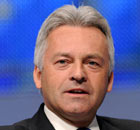 Photograph: Ray Tang/Rex Features
Photograph: Ray Tang/Rex Features
The British government has pledged its support for political reform in Yemen, according to the Press Association news agency.
Alan Duncan (left), the international development minister, said:
Recent events demonstrate more than ever the importance of the Friends of Yemen process to prevent state failure in their country. We will work to support political reform and the right of all Yemenis to participate legitimately and democratically in their political future.
MPs were today told the Friends of Yemen group will meet in Riyadh, Saudi Arabia, in six weeks to discuss how best to help the nation. Duncan, who visited Yemen last week, said there had been "substantial progress on many fronts" in recent months. He added: "Preventing state failure is much less costly than dealing with a failed state afterwards."
The protests in Bahrain are so organised that they even have a media centre, according to this picture (below) by Maryam Alkhawaja, head of foreign relations at the Bahrain Centre for Human Rights.
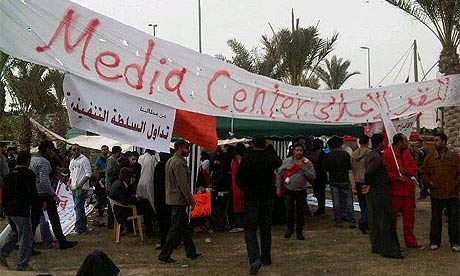 Media centre at Bahrain protests, 16 February 2011. Photograph: maryamalkhawaja
Media centre at Bahrain protests, 16 February 2011. Photograph: maryamalkhawaja
From a distance the protest camp looks like a car boot sale.
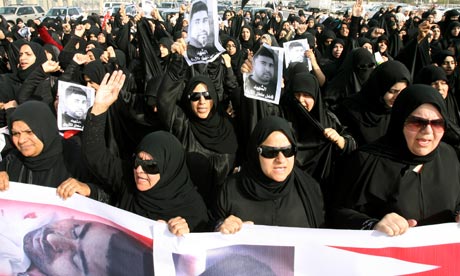 Hundreds of Bahraini protesters shout slogans as the attend the funeral of Fadel Salman Matrouk, who was shot dead in front of a hospital yesterday. Photograph: Adam Jan/AFP/Getty Images
Hundreds of Bahraini protesters shout slogans as the attend the funeral of Fadel Salman Matrouk, who was shot dead in front of a hospital yesterday. Photograph: Adam Jan/AFP/Getty Images
More from Bahrain from another of our commenters, SandyBh, who says people are calling Lulu/Pearl roundabout "the martyr square". He/she says people there have confirmed "there are some Sunnis out there, but not a lot, which is natural considering that the Shiites are the majority and the ruling family is Sunni":

Many Sunnis are either too afraid to go out and protest or they are prevented by their Sunni ideologies that declare people should have complete loyalty to the "wali" or a governing ruler, even though one who is an oppressor (this is to the best of my knowledge and how I see things when I talk with Sunnis). Moreover, you should account for the fact that many of the Sunnis here are actually not Bahrainis for they have been imported from places like Pakistan, Baluchistan, Jordan, or Yemen to work in the Ministry of Defence.
SandyBH went on, in another comment:
You should hear what the people in the roundabout are saying ... They are hailing now and again that their movement is not only for Shiites but Sunnis as well. This is a movement by the people for the people no matter their sect. A lot of people are refusing to call it a Shiite uprising.
As for being afraid of change since they are a minority, no one should have such fears in a democratic government that is well-representative of the population.
As for the foreigners being employed in the Ministry of Defence and police forces, there is a reason behind it. The government has long mistrusted Shiites in Bahrain, and despite being the majority, they are not employed in these two sectors simply because of this mistrust. The percentage of Shiites in the Ministry of Defence is almost non-existent. Even some Sunnis are being aware now of the situation of foreigners in the defence forces and are expressing resentment.
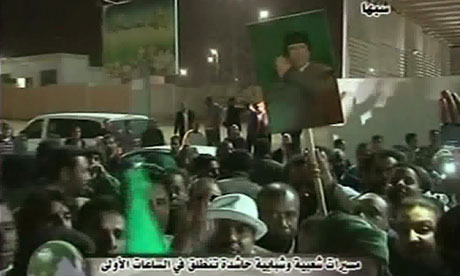 Footage broadcast by Libya's state television showing Libyans holding portraits of Muammar Gaddafi during a demonstration in support of him in the southern city of Sebha. Protesters say that state TV is not showing footage of large, anti-Gaddafi protests. Photograph: Libyan TV/AFP/Getty Images
Footage broadcast by Libya's state television showing Libyans holding portraits of Muammar Gaddafi during a demonstration in support of him in the southern city of Sebha. Protesters say that state TV is not showing footage of large, anti-Gaddafi protests. Photograph: Libyan TV/AFP/Getty Images
Reuters has a fuller report on the clashes in Benghazi.
Here's an edited version:
Reports from Benghazi, about 1,000 km (600 miles) east of the Libyan capital, indicated the city was now calm but that overnight, protesters armed with stones and petrol bombs had set fire to vehicles and fought with police.
The protesters were angry about the arrest of a human rights campaigner and demanded his release. Quryna newspaper, which is based in Benghazi, quoted Abdelkrim Gubaili, the director of a local hospital, as saying 38 people were injured in the clashes, most of them members of the security forces. He said they had all been discharged.
"Last night was a bad night," a Benghazi resident, who did not want to be identified, told Reuters by telephone.
"There were about 500 or 600 people involved. They went to the revolutionary committee (local government headquarters) in Sabri district, and they tried to go to the central revolutionary committee ... They threw stones," he said.
"Now Benghazi is quiet. The banks are open and the students are going to school," the same witness said later.
Summary time:
• Libya: Up to 38 people have been injured in the city of Benghazi after protests about the arrest of a civil rights campaigner and critic of Muammar Gaddafi. There are reports that critics of Gaddafi have been arrested.
• Bahrain: Thousands of protesters have continued to demonstrate at Pearl roundabout in the capital Manama. Our reporter there says there are signs of growing anger at King Hadad, who is seen as responsible for propping up the Sunni-based establishment. Thousands of people took part in a funeral for Fadhel Al-Matrook, a protester shot dead at funeral of another protester yesterday. The US and Britain has expressed concern about the violence.
• Yemen: A sixth day of protests against president Saleh was broken up by pro-government supporters bused in to the capital Sana'a. Up to four protesters were injured, and 2,000 police deployed to break up the clashes.
• Iran: Students and academics have been arrested in a raid at a university in Tehran. A state news agency reported clashes between government supporters and protesters after the funeral of Sanee Zhaleh, who was killed in protests on Monday. President Mahmoud Ahmadinejad said the protests were doomed to fail.
Our Middle East editor Ian Black has this instant analysis on the significance of today's clashes in Benghazi.

Libya's "day of rage," inspired by the uprisings in Egypt and Tunisia, was due to have take place on Thursday but began prematurely with clashes overnight in the eastern city of Benghazi, where 38 demonstrators were injured in clashes with security forces.
Libyan opposition sources say they believe the trouble was deliberately provoked by the authorities to undermine tomorrow's main event — and intimidate people into keeping off the streets.
Sporadic trouble has been reported from Benghazi, the country's second city, in recent weeks, and the latest outbreak was linked to protests over the infamous massacre of over 1000 prisoners at Abu Salim in 1996 — a bloody landmark in Muammar Gaddafi's 42-year rule. But like previous unrest, it remains local and has not coalesced into opposition at the national level. So far.
"This could snowball into something big," says Ashour Shamis, a veteran Libyan opposition activist. "There are grievances all over the country. But this looks like a spoiler by the government."
Libya's experience of the "Arab spring" may be different from that of its North African neighbours for several reasons. Its enormous oil and gas reserves and small population (6.5m) mean it is relatively wealthy — four times as rich as Egypt — and can afford to buy off dissent.
It is also far less free than either of its neighbours, with a pervasive secret police and little in the way of a free media or independent institutions. Behind the facade of the popular committees the security state still looks unassailably powerful.
Gaddafi's Jamahiriya or "state of the masses" has seen a revolution in its foreign relations over the last decade since it surrendered the Lockerbie bombing suspects, stopped supporting terrorism and gave up its wepaons of mass destruction.
Economic liberalisation has benefited a small middle class but otherwise there has been little domestic change. Libya is extremely corrupt by international standards, though there is less of the flaunting of wealth by the elite than in Tunisia. Its army and security services, based on strong tribal loyalties, would almost certainly step in with force in the event of serious political upheaval and possibly take over the country completely.
Gaddafi — now the longest-serving of all Arab leaders — remains as vigorous and eccentric as ever. Talk of the succession of his reformist-minded son, Saif al-Islam, has faded recently in the face of resistance by the old guard. Another son, Mutasim, is a rising star as his father's national security adviser.
Like other Arab regimes it is capable of easing tensions by concessions such as raising subsidies to keep food prices down. But plans to release the remaining prisoners of the long-banned Libyan Islamic Fighting Group who have renounced violence pre-date the current unrest.
One of our commenters below the line, goonerinoman, has provided another update from Bahrain:

Just got back from the Pearl roundabout. I was there for about 30 minutes. I would say there are about 3-4 thousand there. A lot of people were on their way after attending the funeral. I was surprised how different things were from yesterday. I was at the roundabout for the start of the protests yesterday and the roads around were all closed and there were hundreds of police and vehicles. Today there were no police anywhere to be seen and now the roundabout was covered in tents and a mock stage has been erected, all the roads are open as normal and cars are driving round the roundabout. Whereas yesterday people were milling around and it was more of a carnival atmosphere, today it seemed more politicised. There were people addressing the crowds and it was more like a western protest. The crowd were a lot more fired up. I could not understand what was being said as my Arabic is not very good but there was a lot of mentions of Mubarak. Around the edge of the roundabout people had written slogans using stones such as Khalifa r we loud enough for you, a CND symbol, peaceful protest and others in Arabic.
It is weird because about 150 metres [away] is the main highway and it has a flyover, it is the perfect vantage point to stop and watch - it is like a drive thru protest. It seems like the protesters are not giving up easily. I imagine they may be joined by some Saudi Shias as the Saudi weekend starts now. I think with the US Naval base here it can't go on for too long and the F1 race looming on the horizon. I can't imagine the Shias giving up without a fight. I am by no means an expert but I think the Shias are not afraid of martyrdom because of events like Ashoora. I really hope I am wrong but I think it will get messy. I guess Friday like in Egypt will be the crunch day. I am also amazed by the normality of it all.
Some reports on Twitter are saying two people were killed in Benghazi but we have no way of verifying them at present.
The Guardian is compiling a database of the missing and detained in Egypt since the recent protests. If you have any information please use the form provided to help us to update it.
There's limited information coming out from Benghazi, with reporters not on the ground there and not much in the way of first-hand accounts online. But the Libyan youth movement tweets that violence against protesters is continuing:
right now in #benghazi, tear gas being thrown in the city center and have blockaded the city center #Libya #Feb17
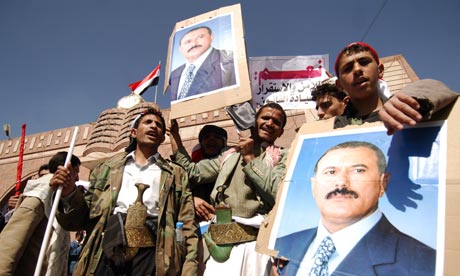 Pro-regime protesters holding posters of their president gather near Sana'a University, Yemen. Photograph: Mohammad Huwais/AFP/Getty Images
Pro-regime protesters holding posters of their president gather near Sana'a University, Yemen. Photograph: Mohammad Huwais/AFP/Getty Images
Pro-Saleh supporters are being bused in to the Yemeni capital Sana'a to beat anti-government protests, Tom Finn reports.
People have seen them arriving in buses, and they have also seen people handing out signs and sticks and weapons to plain clothes men from the back of SUVs and trucks at the protests.
The danger in Yemen is that it is a heavily armed country. There are three times as many guns as people here. What people are very worried about is that if things become violent it may escalate.
There were three or four students injured today. The pro-Saleh guys have been pre-empting the demonstrations. They have been arriving in the morning at the places that the anti-government protests are due to take place. It sounds like the numbers are similar [on both sides].
The protests are much much smaller than anything that happened in Egypt. The difference now is that they are becoming more violent. And also, importantly, they are no longer under the control of the opposition.
President Saleh is worried and he's making efforts to calm these protests. He has cancelled a trip to Washington. But he does have more support than Mubarak had in Egypt.
As things stand it is still a small group that is protesting [in Sana'a]. The real concern is taking place in Taiz, a city in the south. There you have seen demonstrators staying out over night, and people being arrested, and larger protests. People are saying that if something is going to happen it may well happen in the south, as opposed to in the capital.
-
Labour unrest is continuing in Egypt despite the ruling military council's call for "noble Egyptians" to end all strikes immediately, the Associated Press reports:
Hundreds of Cairo airport employees were protesting inside the arrivals terminal Wednesday to press demands for better wages and health coverage. In the industrial Nile Delta city of Mahallah al-Koubra, workers from Egypt's largest textile factory went on strike over pay and calls for an investigation into alleged corruption at the factory.
In Port Said, a coastal city at the northern tip of the Suez canal, about 1,000 people demonstrated to demand that a chemical factory be closed because it was dumping waste in a lake near the city.
The Guardian's Twitter network of Arab and Middle East protests has been updated to include Libya.
Al-Arabiya TV and AFP (via Zawya.com) are both now reporting 38 injured in the violence in Benghazi, citing medical sources in the city.
The artist, Muhammed Al-Amin, and the author and poet Habib Al-Amin have been arrested in Benghazi, according to @EnoughGaddafi on Twitter. Another writer, Idris al Mesmari, was reportedly arrested in Libya's second largest city, hours after a telephone interview with al-Jazeera in which he told the television station:
I am scared, really scared. The regime's cars and thugs are attacking us. They're attacking Libya's youth. They're using hot water cannons.
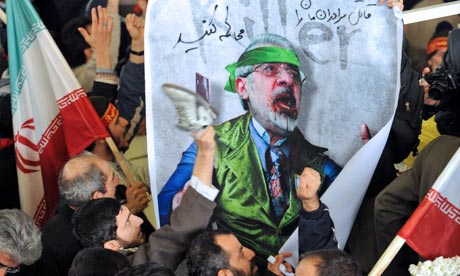 Iranian government supporters hit an image of opposition leader Mir-Hossein Mousavi with their shoes in Tehran, Iran. Photograph: Stringer/EPA
Iranian government supporters hit an image of opposition leader Mir-Hossein Mousavi with their shoes in Tehran, Iran. Photograph: Stringer/EPA
Ten students and academics were arrested at a raid on a university in Tehran, according to Omid Habibina, a former journalist with BBC Arabic and a state news agency.
He tweets:
Reports: 10 Art Uni. Students & Professors Arrested, inc Ali Akbar Alizadeh Head of Cinema Faculty. #25Bahman #Iran #Tehran #Neda
He also posts a link to a Facebook video of the raid.
There seems to be a sense of frustration that the protests in Benghazi, Libya's second biggest city, have not caught on in the capital Tripoli, even though tomorrow is supposed to be the big day for demonstrations to commemorate the failed uprising against Gaddafi in 2006:
guys in Tripoli get out onto the streets, start with 100, or we will see a massacre in #Benghazi, its now or never, #Libya #Feb17
@freetelw yes in Tripoli #libya. Nothing but staged [pro-Gaddafi] protest now going on here. Tripoli wake up!!!!!!
Protesters arranged themselves on the Pearl roundabout to spell out the slogan "down with the regime", according to Maryam Alkhawaja, head of foreign relations at the Bahrain Centre for Human Rights.
She posted this picture to Twitter with the caption:
They wrote with humans "yasqe6 alnedham" down with the regime in #martyrssquare #bahrain #feb14
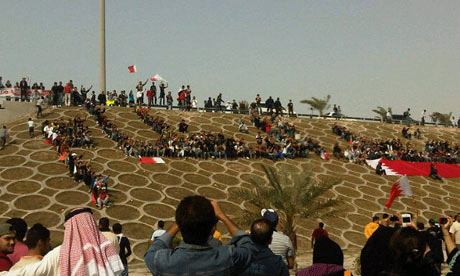 Protesters in Bahrain spell out "down with the regime" 16 February 2011. Photograph: maryamalkhawaja
Protesters in Bahrain spell out "down with the regime" 16 February 2011. Photograph: maryamalkhawaja
_
By most accounts the protests in Bahrain were peaceful before shots were fired by the security forces, and yet the British Foreign Office has called on both sides to exercise restraint (it trotted out the same line on Egypt at the start of the protests).
Alistair Burt, the minister for the Middle East and north Africa, said:
I am concerned by the reports of excessive use of force by police during demonstrations in Bahrain that led to the death of two protesters. I call on all sides to exercise restraint and refrain from violence.
The UK will always support, and speak out in defence of, the right to peaceful protest and freedom of expression. It is now critical that the Bahraini government moves quickly to carry out its commitment to a transparent investigation into yesterday's deaths and any alleged human rights abuses.
When he was in Bahrain last week the foreign secretary raised the importance of open, plural societies, and of promoting universal values. I welcome the progress that the government of Bahrain has made on political reform in the recent past, but it is essential that this process continues to meet legitimate aspirations for greater political and social freedoms.
The Bahrain government and monarchy are "clearly rattled" by the demonstrations, Martin Chulov reports from Pearl roundabout in Manama.
At the roundabout this morning there at least 5,000-10,000. This is a group that has got itself organised – there are marquees and first aid tents everywhere. It has a sense of a protest movement that is gaining momentum. The police are staying away ... All access points to this area are being coordinated by citizens.
It is predominantly Shia. They are saying they have been pushed into a sectarian corner. They are looking for a greater role in society in Bahrain. They feel emboldened by what's happened in Egypt and Tunisia. A secondary concern, fast becoming a dominant one, is that the king should leave.
They are not placated. The monarch has been largely responsible for buttressing the Sunni-based establishment. The lightening rod for the discontent is the monarch.
It does have a feel of a movement that is going somewhere. The government and the monarchy are clearly rattled by it. Instinctively it feels like one to watch.
_
The Libyan youth movement says there are reports of a first death in Benghazi, that of a teenager.
Alot of reports coming out of the first to be killed in benghazi, 17 year old from well known family #Feb17 #Libya
Meanwhile, freetelw tweets that it is quiet in the Libyan capital at the moment with just some organised pro-Gaddafi protests:
#Tripoli just got back from Green Sq (12.30 pm)..bunch of 'pro-Gaddafi protesters' are chanting..they brought high school students in groups
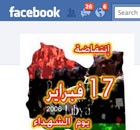
Like the other countries in the Middle East and North Africa in revolt, Libya has its own Facebook protest page.
A recent post (in Arabic) is urging "all the youth of Tripoli" to go immediately to Omar Mukhtar Street. It seems to be saying that there are no military battalions in the Libyan capital at the moment, only security forces, which would tie in with comments on Twitter that the regime has been taken by surprise by the protests.
The Associated Press news agency has a bit more on the protests in Yemen today (see 9.57am). According to AP, Yemen has sent 2,000 policemen into the streets to try to stem the demonstrations, which are in support of political reforms and against the president, Ali Abdullah Saleh.
The policemen, including plainclothes officers, fired in the air and blocked thousands of students at Sanaa University from joining thousands of other protesters elsewhere in the capital. They are holding a sixth straight day of demonstrations ...
Witnesses say at least four protesters were wounded in scuffles with police on Wednesday.
Yemen is a conflict-ridden and impoverished nation. Its president has cooperated with the US in battling al-Qaida in the Arabian Peninsula.
Blogger Redha Haji has posted a series of photographs of today's funeral of Fadhel Al Matrook.
One shows that the Bahrain flag was placed over his coffin before he was buried.
The Guardian wrote yesterday about how young people in the Arab world use rap as a way to express themselves and as a rallying call. This rap track is promoting tomorrow's protests in Libya. One image featuring Gaddafi says: "Send the devil back to hell," while there are also numerous images of the protests in Egypt and Tunisia, showing the influence of the revolutions in those two countries.
_
The respected Middle East analyst Juan Cole predicts what might happen if the Shia majority were granted more representation and power, as protesters are demanding.
A Shiite-dominated government in Bahrain might well demand a closure of the US naval base. It would not be an Iranian puppet, insofar as Arab Shiites are jealous of their independence and most Bahraini Shiites don't follow ayatollahs; but it would certainly have warm relations with Tehran. A Shiite victory there would politically embolden other Gulf Arab Shiites, in Kuwait, Saudi Arabia, and the United Arab Emirates (Shiites are a minority in all three). Insofar as Iran enjoys soft power with the region's Shiites, the net result would certainly favour Iran and at least somewhat disadvantage the United States, which already shot itself in the foot by helping install a Shiite government in Baghdad that has excellent relations with Iran. For the Bahrain government to become more democratic and more Shiite-influenced would annoy the Wahhabi Saudi state, which now sees the Sunni Bahraini king as a strategic asset.
If, like me, you are on a steep Bahrain learning curve, the piece also provides a useful backgrounder. Did you know that more than half the people in Bahrain are guest workers?
There are reports of clashes between pro-government supporters in Libya, Iran and now Yemen.
Reuters has this:
Government loyalists wielding batons and daggers clashed with anti-government protesters in the Yemeni capital on Wednesday. Police were unable to keep the two sides apart as protesters gathered for a demonstration at Sana'a University to demand the resignation of President Ali Abdullah Saleh.
Hundreds of Saleh backers charged at protesters, who quickly fled. One student was wounded, a Reuters reporter said.
A few hundred more student demonstrators emerged from inside the university to try to restart the rally. When police locked them inside the campus, they began throwing rocks at the government loyalists from the campus gate.
"We'll keep protesting until this regime leaves," said Murad Mohammed, a Yemeni university student at the disrupted protest. "We have no future under current conditions."
The opposition coalition has agreed to negotiate with Saleh, but many young protesters are getting frustrated.
"We want change and we want to make that change the way the Egyptians and Tunisians did," said Meshaal Sultan, a Sanaa University student, referring to the revolts that ousted the presidents of Egypt and Tunisia over the last month.
Jack Shenker has written about how political activists in the country fear the revolution is being hijacked by the army but the April 6 Youth Movement has put out a statement to followers of its Facebook page declaring its "full faith in our honourable military forces". However, the group of online activists also called on the army to expedite the release of political prisoners:
April 6 Youth Movement calls on the Egyptian armed forces to speed up the release of political detainees who were arrested in the era of the former regime, as well as the immediate release of all detainees who participated in the uprising of January 25th.
The sources inside the armed forces had told April 6 Youth Movement through the meetings that has [sic] been going on Thursday, February 10, that those who were arrested since January 25th will be released within days, but we are calling for fast release of all detainees to maintain the security in Egypt ...
April 6 Youth Movement has full faith in our honourable military forces and we are sure that they will release all the innocent victims of our former oppressive regime.
The Associated Press is coming under fire on Twitter for a line in its story about the Libyan protests (picked up by various news outlets) that says: "The crowds, however, did not appear to direct their anger at Muammar Gaddafi."
SMH @HuffingtonPost @AP Protests in #Benghazi were solely towards #Gaddafi despite direct evidence, continue to report misinformation #Feb17
They say the revolution will not be televised. Fine. Can we at least get it reported correctly? @AssociatedPress #Benghazi #Feb17 #Libya
Incidentally, it appears that a big demonstration is planned for tomorrow in Libya – the hashtag #Feb17 is being used on Twitter – but protests started early in Benghazi. There is a lot of video emerging of last night's protests in the city.
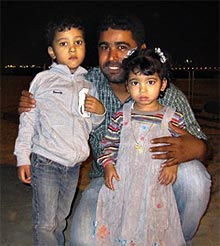
This photograph has emerged of Fadhel Al-Matrook the protester who was killed in yesterday's clashes. It shows Matrook with his son and daughter, according to the Facebook group True Royal Democracy.
Thousands of people have gathered for his funeral today where he is being hailed as a martyr.
Below the line in the comments section, goonerinoman claims to be witnessing events in Bahrain.

Going to have a wander down to the Pearl roundabout in an hour. Will keep you all informed as to what's going on there. People back at work today but from what I have heard there are still lots of people at the roundabout. Bahrain is a small place and the Pearl roundabout is right in the middle of the shopping malls and the main highway and very near the financial centre.
Global Voices has a typically-thorough round-up of the latest social media updates on the protests in Bahrain. It reports:
Similar to Tuesday, hundreds of protesters headed towards Salmaniya hospital to collect the fallen man's body and begin the procession to Sheikh Maytham cemetery in Mahooz in Manama. Unlike yesterday, the procession was allowed to move smoothly without police interference.
Harriet Sherwood has more on the speculation about the whereabouts and health of the former Egyptian president Hosni Mubarak.

The Al Arab news site claims that Hosni Mubarak is now holed up in a luxury hotel in the Israeli resort of Eilat.
Apparently there is a big Israeli security presence around the unnamed hotel, and aircraft are hovering above monitoring activity. Indeed, an anonymous hotel employee "revealed" that Mubarak was a guest.
The ousted president has also been reported to be in Sharm el Sheikh, in Germany, in Dubai, in a coma, in a state of severe depression and at death's door.
It is getting hard to keep track of the various protests across the Middle East. Now Iran's state broadcaster IRIB is reporting clashes between government supporters and protesters in Tehran.
"Students and the people attending the funeral ceremony of the martyred student Sanee Zhaleh have clashed with a limited number of people apparently linked to the sedition movement and forced them out by chanting slogans of death to hypocrites," it said, according to Reuters.
Zhaleh was shot dead during an opposition rally on Monday, a killing the government blamed on anti-government protesters but which opposition websites say was done by security forces.
Activist Saeed Valadbaygi is running a Facebook commentary on the latest unrest. One of his updates says:
University doors have been closed and chants of "down with Khatami and Down with England" is seen around Valiasr.
Another says:
A largely organised group of Basij is being transferred to the funeral place through the BRT line.
Protesters are holding their ground at the Pearl roundabout, AP reports.
Security forces have pulled back sharply apparently on orders to ease tensions after clashes that left at least two people dead and dozens injured.
Police helicopters, however, flew low over a major funeral procession for one of the victims in which mourners called him a "martyr" and pledged more protests in the island nation home to the US Navy's 5th Fleet.
Thousands of people spent the night in a makeshift tent camp in Manama's Pearl Square, which was swarmed by demonstrators a day earlier. One demonstrator used a bullhorn to call on protesters to remain until their demands are met, as the Arab wave for change takes hold in the Gulf.
The protests began Monday as a cry for the country's Sunni monarchy to loosen its grip, including hand-picking most top government posts, and open more opportunities for the country's Shia majority, who have long complained of being blocked from decision-making roles.
US State Department spokesman PJ Crowley has expressed concern about events in Bahrain. In a statement last night, he said:
The United States is very concerned by recent violence surrounding protests in Bahrain. We have received confirmation that two protesters in Bahrain were recently killed, and offer our condolences to the families and friends of the two individuals who lost their lives.
The United States welcomes the government of Bahrain's statements that it will investigate these deaths, and that it will take legal action against any unjustified use of force by Bahraini security forces. We urge that it follow through on these statements as quickly as possible. We also call on all parties to exercise restraint and refrain from violence.
Mobile phone footage of the protests at the Pearl roundabout is being streamed to the video sharing site Bambuser.
Video has emerged of protesters in Benghazi demanding the release of a human rights lawyer and critic of the regime of Muammar Gaddafi.
The state news agency Jana reports a series of pro-Gaddafi rallies, including in Benghazi, the Middle East expert Scott Lucas reports on his Enduring America blog.
A video from Benghazi, dated yesterday, appears to show a protest being broken up by gunfire. (Note: there is some dispute over when this video was filmed.)
_
Meanwhile, a human rights group claimed that a 110 prisoners jailed for membership of banned militant organisation the Libyan Islamic Fighting Group will be released today.
Reuters has this:
The prisoners are the last members of the group still being held and will be set free from Tripoli's Abu Salim jail, chairman of the Libya Human Rights Association Mohamed Ternish told Reuters.
Hundreds of alleged members of the group have been freed from jail after it renounced violence last year.
Protests continue in the Middle East and North Africa. The latest flashpoints are Bahrain, where demonstrations continue for a third day despite the intervention of King Hadad, and Libya where the arrest of a human rights campaigner sparked clashes with police in the eastern city of Benghazi.
Up to 2,000 people were involved in the clashes in Libya, according to the BBC.
Eyewitnesses told the BBC that the unrest had been triggered by the arrest of a lawyer who is an outspoken critic of the government.
The lawyer was later said to have been released, but the demonstrations reportedly continued..
They [the witnesses] say stones were thrown at police who are said to have responded with water cannon, tear gas and rubber bullets.
In Bahrain protesters have occupied Pearl roundabout, a landmark in the capital Manama. Thousands of people are expected to take part in a funeral procession for Fadhel Matrook who was killed at a funeral yesterday.
Here's a round-up by country of yesterday's events in the region:
Bahrain
King Hamad tried to quell unrest by promising to investigate the killings of opposition protesters. Ali Abdulhadi Mushaima was killed in Monday's protests. Fadhel Matrook was shot when security forces fired at crowds of people who had gathered yesterday for Mushaima's funeral.
The opposition Shia party al-Wifaq, announced that it was withdrawing from parliament in protest against the crackdown. This was a key event, writes our Middle East editor Ian Black, because political participation al-Wifaq party is seen as crucial to political stability, as a leaked US embassy cable revealed.
Yemen
Protests calling for removal of President Ali Abdullah Saleh have been taking place for last five days in the capital Sana'a. Yesterday pro-government supporters clashed with protesters yesterday amid alarm about increasing violence.
Egypt
• Elements of Egypt's fractured political opposition are concerned that the army will hijack the revolution. They are alarmed by the army's unilateral declarations of reform and the apparent unwillingness of senior officers to open up genuine negotiations with activists.
• The Muslim Brotherhood announced that it plans to set up a political party.
• The Guardian is compiling a database of those missing and detained during the unrest in Egypt.
• Barack Obama said his administration was "on the right side of history" for its response to the downfall of the Mubarak regime.
•
CBS News journalist Lara Logan is recovering in hospital after being violently attacked and sexually assaulted by a mob in Egypt's Tahrir Square on Friday.
Iran
The authorities confirmed that a second person had died in Monday's unrest, in which security forces used teargas, pepper spray and batons against the protesters. Around 1,500 were arrested in the protests. MPs have branded opposition leaders Mehdi Karroubi and Mir-Hossein Mousavi "corrupt on earth" a charge that carries the death penalty.
Jordan
The government sought to head off trouble by easing restrictions on public gatherings. Jordan's interior minister Saed Hayel Srour said that protesters would still have to inform authorities of any gathering two days in advance to ensure public safety.
Tunisia
The new government extended a state of emergency in place since Zine al Abidine Ben Ali fled to Saudi Arabia, but ended a curfew imposed during the protests.
Morocco
The government appears to be trying to calm fears over price hikes on basic goods ahead of a Facebook-arranged protests planned for next Sunday. It has doubled the money it sets aside for state subsidies to counter rising global commodity prices.

